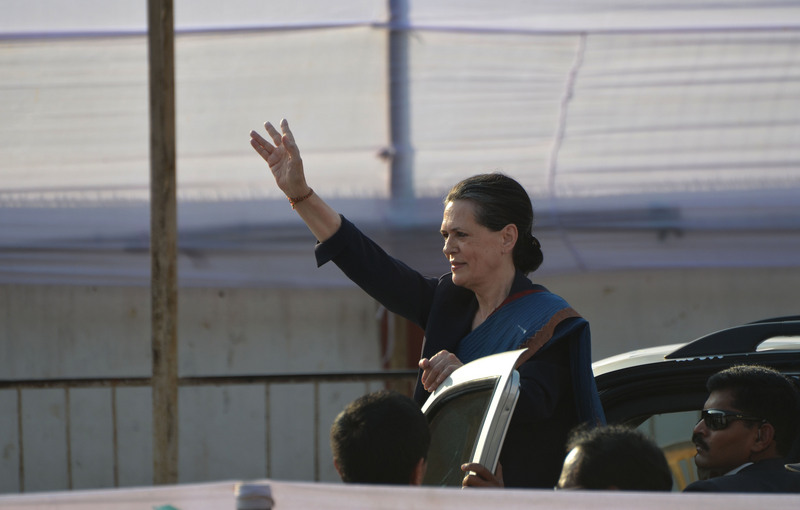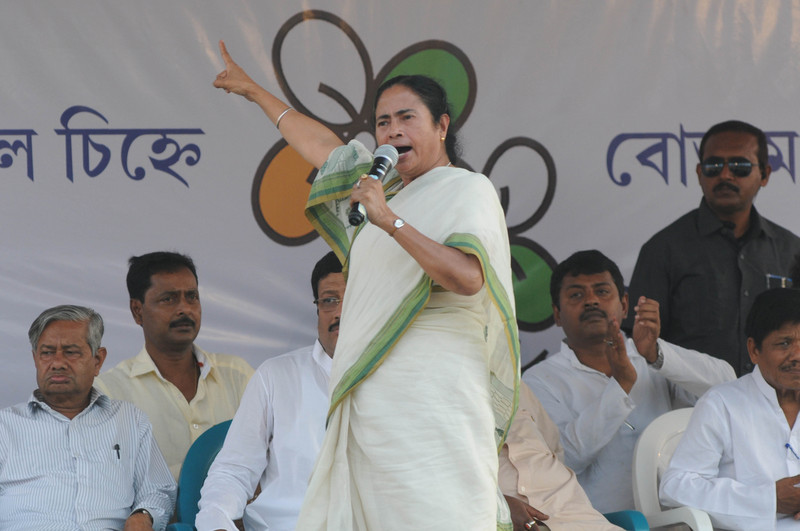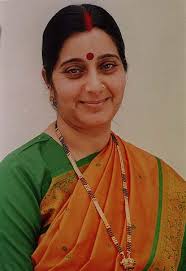
Sonia Gandhi, current AICC president and widow of former Prime Minister of India Rajiv Gandhi campaigns for Assembly elections in the eastern state of Nagaland. Image by Caisii Mao. Copyright Demotix (7/2/2014)
India may be infamous for the crimes committed against women within its borders, but the country has several female leaders who have risen to the top and changed the course of the country's politics.
With India's general elections – the world's largest – underway, get to know a little more about the country's leading women politicians.
Sonia Gandhi: The queen bee
Italian-born Sonia Gandhi has been the chief of the Indian National Congress Party, one of the two main political parties in India, since 1998. She has also been the chairperson of political coalition United Progressive Alliance since it was formed following the 2004 elections.
She is the wife of assassinated Indian Prime Minister Rajiv Gandhi, and her son Rahul Gandhi stands as the heir of the Gandhi family's political legacy. Rahul Gandhi, second in command of the Indian National Congress, is also participating in the elections this time and is pitted against the right-wing Bharatiya Janata Party (BJP) candidate Narendra Modi.
Forbes’ magazine named her the world's ninth most powerful person in 2013. Her reputation as a leader, however, has been overshadowed by the multitude of corruption cases against her party, such as her husband and party's involvement in an arms scandal in the 1990s, in which the Indian government accepted illegal kickbacks for the sale of weapons from Swedish company Bofors. She has therefore been the target of several such comments on Twitter:
Factuals on Sonia Gandhi wealth. Where did she find her wealth; surely not on salary as President of Cong Party? pic.twitter.com/x2xLUxWBRJ
— K Khorana (@oldkrish) April 5, 2014
Jayalalitha: The “mother”
“Amma” or mother is how former film star and current politician Jayalalitha's fans know her in the southern state of Tamil Nadu. Jayalalitha is the chief minister there and the head of the state political party All India Anna Dravida Munetra Kazhagam (AIADMK). M.G. Ramachandran, a revered actor himself and an eminent politician in Tamil Nadu introduced her to politics in the 1980s.
Jayalalitha Jayaram (#bday), the Queen of Tamil Nadu, dressed as the Queen of Egypt. (Anyone recognise the film?) pic.twitter.com/tQGrWcJQL3
— India in Pictures (@indiainpix) February 24, 2014
Jayalalitha came to be known as the Imelda Marcos of India after a raid in 1996 exposed a cache of more than 10,000 silk sarees and several hundred kilograms of gold and silver in her house and she was briefly jailed in 1997. For the 2014 elections, Jayalalitha or “Puratchi Thalaivi,” (revolutionary leader) as she is known to her followers, has decided to join the third front featuring smaller parties, to counter the right-wing BJP and Congress coalitions.
Mamata Banerjee: The “elder sister”
“Didi” is how Mamata Banerjee's supporters call her. She is the chief minister of West Bengal and the head of the All India Trinamool Congress party. She made a name for herself in Indian politics after becoming the country's first woman railway minister in 2002. She also supported farmers in Nandigram in West Bengal who were against the acquisition of land for the construction of a special economic zone.

Chief Minister of West Bengal Mamata Banerjee campaigns in South Tripura. Image by Reporter #24728. Copyright Demotix (1/4/2014)
“Didi”, who has more than 688,000 fans on Facebook, is no stranger to controversy, be it lashing out at criticism:
A concerted movement to stifle free speech in India. ‘WB govt. moves to ban film criticizing Mamata Banerjee. http://t.co/lbz4SXwKfn
— Narahari Vittal Rao (@vnarahari) February 25, 2013
Or for not heeding the Election Commission's rules:
Election Commission tells Mamata govt to comply with directives, transfer officials
— India Today (@IndiaToday) April 8, 2014
Mayawati: The “little sister”
Mayawati, the former chief minister of Uttar Pradesh in northern India, is a shining example of social upliftment. She joined politics in 1977 and is the head of the Bahujan Samaj Party (BSP). Bahujan in Hindi means “diverse people” and is supposed to denote the lower and backward castes in Indian society.
Mayawati's supporters adore her, but she was criticized for installing her own statues all over Lucknow, the state capital, and for wearing a garland made of rupee notes worth several million.
Can you forget Mayawati's garish garland made of currency notes? #MoneyMaya #janlokpal pic.twitter.com/FqZkIkh
— Voice of the people (@janlokpal) September 6, 2011
Sushma Swaraj: Simply herself
Swaraj is currently the leader of the Indian opposition in the lower house of the Indian parliament, called the Lok Sabha. She is a member of the Bharatiya Janata Party, the country's main right-wing political party, and may have been a candidate for prime minister had it not been for Narendra Modi. She has more than a million fans on Twitter.
Swaraj was the youngest cabinet minister.
The winner with greatest share of votes in 2009: Sushma Swaraj (BJP), 78.8%, from Vidisha, Madhya Pradesh http://t.co/IxVPQfpngk #1bnvotes
— CNN-IBN News (@ibnlive) April 8, 2014
There are several other female politicians who have made their mark in Indian politics and may play a decisive role in forming the government this time around. These include Smriti Irani from the Bharatiya Janata Party, leader of the Communist Party of India Brinda Karat, and Uma Bharti also from Bharatiya Janata Party.








3 comments
These women have inspired and brought about a change in Indian politics.
They’re the Queen’s of the “Kings” and the “King-maker’s.” Here’s more
on them…@ http://www.collegeokplease.com/life-style/the-most-powerful-women-in-indian-politics/711